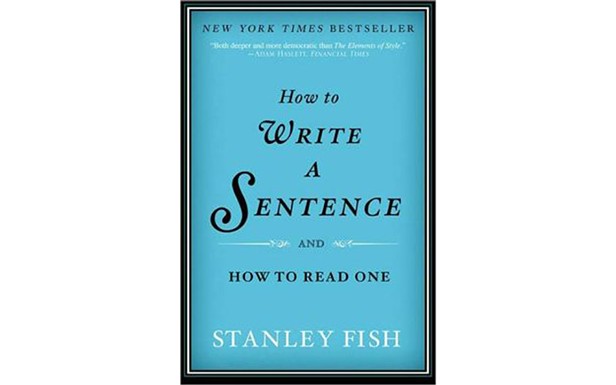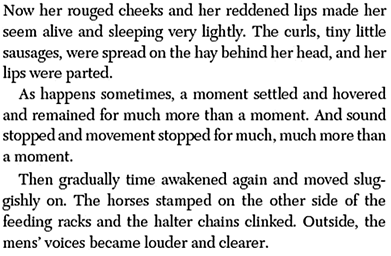
I have just finished Professor Stanley Fish’s, How to write a sentence and how to read one. It was a delight. Whilst I was reading it, I thought of two John Steinbeck sentences which I have always admired. Now feeling sufficiently emboldened, here is my attempt to explain why the sentences in question have stuck so resolutely in my memory since I first read them many decades ago.
In his book Fish explains that, no matter how much one attempts to analyse them separately, form and content are, ultimately, one entity. He cites Joseph Conrad’s proposition that, “It is only through complete unswerving devotion to the perfect blending of form and substance; it is only through an unremitting, never discouraged care for the shape and ring of sentences that an approach to plasticity, to colour, and the light of magic suggestiveness may be brought to play for an evanescent instant over the commonplace surface of words, of the old, old words, worn thin, defaced by ages of careless usage”. Fish is particularly interested in Conrad’s notion that the most ordinary of words can form a sentence which captures the extraordinary, fleeting essence of life. He explains that a sentence is a moment in a stream of sentences. It can be an opening sentence which suggests what is to follow, or it can be a final sentence which summarises, alters or undermines all that has come before. But, generally, a single sentence holds a moment which has both a past and a future.
And so it is with these two particular sentences from Steinbeck’s oft traduced, but perfectly formed novella, Of Mice and Men. The title’s allusion to Burns’ poetic tale of “grief and pain” suggests that it is just a matter of time before disaster befalls Lennie. Each preceding sentence builds inexorably to the moment when Lennie accidentally kills Curley’s wife; every sentence after hurtles the reader towards the tale’s shattering conclusion. But, for a few seconds after Curley’s wife exhales her last breath, the action pauses, as both Lennie and the reader recognise the import of what has just transpired.

This is the narrative’s hinge-point moment. Lennie’s life is about to change irrevocably because he has just killed Curley’s wife. He knows he has done a “bad thing”. There she lies, dead at his clumsy hands. Steinbeck mimics the reader's response – and that of Lennie’s – in the prose itself. He crafts Conrad’s “light of magic suggestiveness…brought to play for an evanescent instant”. Steinbeck creates the sense that “time stood still”, a hackneyed phrase to describe something many people feel at monumental moments in their lives. Of course time does not “stand still”. Rather, when faced with great crisis or great joy, human beings use all their senses to process what has befallen them. Once they have done that, they respond to the matter in hand. And so it is here, as both Lennie and the reader realise simultaneously the scale of the consequences of what has just occurred seconds earlier.
Steinbeck begins the first sentence with, “As happens sometimes”, the vagueness of “sometimes” working to take the reader away from the scene confronting them. He wants the reader to remove themselves from the events in the barn whilst, at the same time, process what has taken place. He then introduces another indefinite – “a moment” – which is used three times in two short sentences. Steinbeck’s trick is simple: we experience this “moment” in the same timeframe as it is happening to Lennie in the barn. Crucially, Steinbeck does not get drawn into the mistake of describing how long the moment lasts, because that would have been impossible to articulate meaningfully. Consequently, he avoids using the formal measures of time, or even the word ”time” itself. Instead he focuses upon the “moment” as an animate being which “settles” and “hovers” and “remains”, like a butterfly that arrives and stays and departs before you have the chance to appreciate it. The uncertainty implicit in how the moment “settles”, then “hovers” again, and only then is confident enough to “remain”, illustrates Steinbeck’s “care for the shape and ring of sentences”. The moment simply lasts as long as it takes us to read the two sentences which, when read aloud, is approximately 11 seconds.
Steinbeck begins the second sentence with “And”. He is not ready to interrupt the reader, who is still grasping the implications of what has happened. It is not time that has stopped, but two things that occupy time: “sound” and “movement”. Steinbeck allows us to reflect in silence. He ends the second sentence as he ends the first, but inserts an extra “much”, almost slowing the prose to a complete stop. “[M]uch, much more than a moment” gives the reader a further second to reflect, before the narrative resumes and hurries towards the terrible denouement. Steinbeck slows the whole paragraph down, not with excessive punctuation but with the repetition of words which Conrad might describe as “old, old words, worn thin” – “and”, “much”, “moment” and “stopped”. He returns the reader to the events of the story just before the reader realises what he is doing.
Every time I read these paragraphs, I am aware of Steinbeck’s literary chicanery but still only “wake up” to what he is doing just as he brings me back to the barn and the events of the narrative. It is as if he has hypnotised me for those 11 seconds. The narrative is suspended for the perfect length of time: a second shorter and the full impact of Curley’s wife’s death is not felt; a second longer and we would detect Steinbeck’s artifice. It is only after we re-join the narrative that he uses the word “time” which, like us, is “awakened” from its momentary trance. And beyond the horses are the men, whose lawless thirst for justice will command Lennie’s fate.
Steinbeck’s two sentences, shaped with the most “commonplace” of words, exemplify Conrad’s “perfect blending of form and substance”. Not only do the sentences create a momentary pause in the novella’s narrative, the sentences are the pause. Although Professor Fish may have not mentioned him in his book, John Steinbeck certainly knew how to write a sentence (or two).

